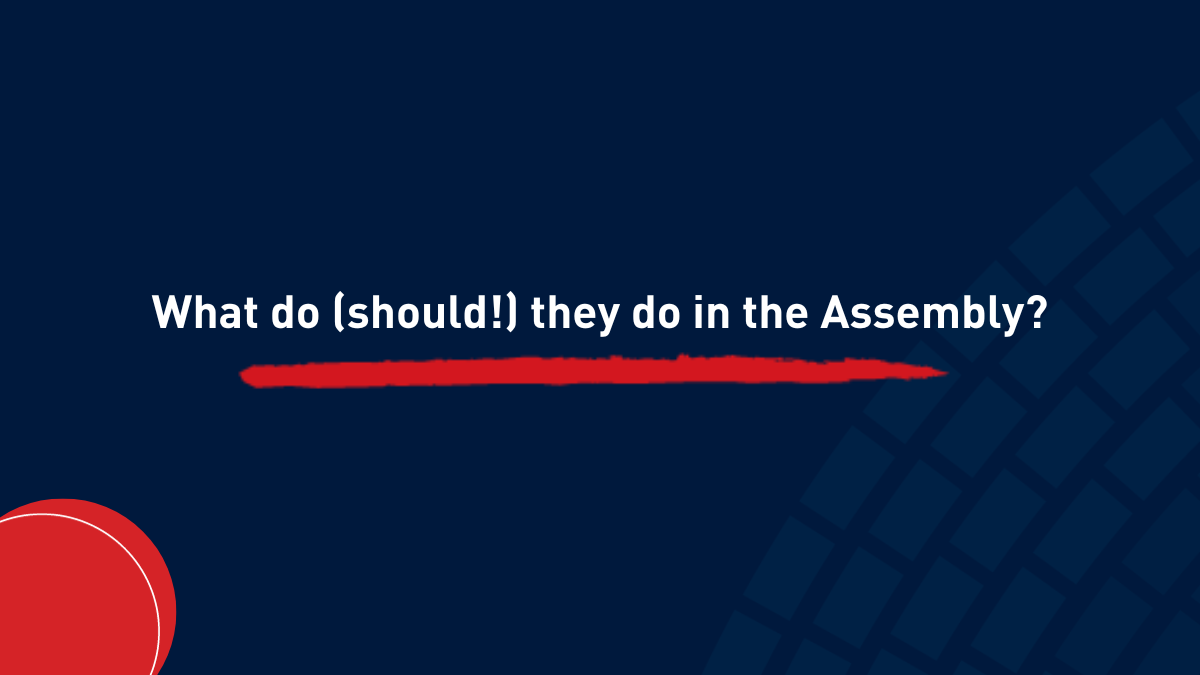
Through 30 street actions across Serbia from October 2022 to May 2023, the Open Parliament engaged citizens with one question: ‘What do (should!) they do in the Assembly?’. With this question, we gathered various opinions from citizens about the National Assembly of Serbia, collected their questions and messages addressed to the MPs, and discussed the functioning of the state parliament, constitutional mechanisms influencing its work, and ways to contact members of parliament.
The Open Parliament stepped into this mission prompted by the results of a public opinion survey conducted by CRTA. For the past few years, there has been growing dissatisfaction among citizens with the work of the National Assembly (41% of citizens are dissatisfied with the work), and as many as two thirds of citizens believe that MPs care more about the interests of their political parties rather than about citizens – 72%.
Apart from the fact that through numerous conversations we became convinced of this kind of citizens’ attitude towards the Parliament, we also discovered that many of them lack sufficient knowledge about the National Assembly’s functions and are unaware of its responsibilities. Moreover, the 1,572 messages sent by citizens to MPs provided us with valuable insights into their perspectives on the Parliament, their concerns about the legislative body’s role, and the scope of its activities.
As a matter of fact, those who are familiar with the work of the Parliament, in the largest number of cases (27%), called on the MPs to be accountable and to adequately represent in the Parliament the interests of the citizens. In the messages, they insisted that MPs should work in the interests of the citizens, not the party, that the Assembly, as “the highest legislative body, should serve as a control of the executive branch, whether it is the government or the president, rather than being subservient to them”. They also inquired “when the rule of law would be established in Serbia”, and whether it was possible for MPs to “behave civilly while in a live broadcast”.
Calls for accountability were followed by negative evaluations of the MPs’ work. Out of all the collected messages, 18% of them were related to criticism, and the citizens pointed out that “there was too much noise, quarrels and insults in the Parliament”, that they were “disappointed” with what they saw in the Parliament. They also asked when the captured institutions would start functioning.
The large number of questions concerning local problems shows that it is not entirely clear to the citizens where the competences of the Parliament begin and end. Infrastructural, economic, environmental and similar issues at the local level made their way into 12% of the messages gathered by the Open Parliament. Citizens asked MPs to pave the streets in their neighbourhoods, to build kindergartens, implement sewage systems, renovate parks and stadiums, as well as to solve the issue of stray dogs.
We observed concern for the young, unemployed and socially vulnerable groups in 9% of citizens who decided to address the MPs through the Open Parliament. Thus, in the messages, we read calls to MPs to help “young people get a job and have a future” and to “take care of single mothers”. They wanted to know how MPs intended to solve the housing issue of young people and to protect children who are “potential victims of domestic violence or some other form of exploitation”.
The standard of living was a priority for 8% of the citizens we talked to. They primarily drew the attention of the MPs to the high prices of essential goods, urged them to increase pensions and salaries, as well as social assistance. They also sought answers to the question of “how to survive on minimum wage”.
Other messages included praise for the MPs, but also dissatisfaction with the state of health care, the education system, the judiciary, and agriculture. Some citizens quoted the misuse of the media, the current election conditions, Serbia’s relationship with the EU and Russia. There were also those who criticised the relations between the incumbent parties and the opposition.
All the discussions and messages have served as a stark reminder of the considerable gap between citizens and the parliament and between the Parliament and citizens. It is precisely in this intermediate space where we encounter a widespread opinion that MPs exclusively represent the interests of the party they belong to, that the Assembly has become only an arena for political calculations, with the process of passing laws reduced to a mere formality. This image calls for a transformation, necessitating a shift towards citizens’ interests and priorities. The Open Parliament, through its 30 street actions, has taken 30 more steps toward this objective.